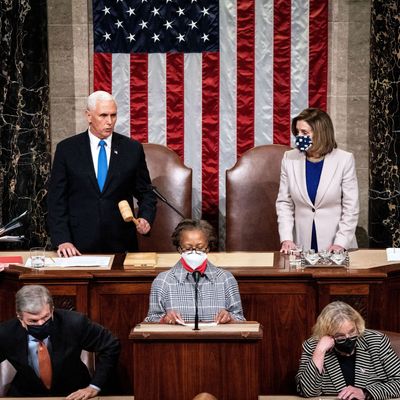
As we approach the one-year anniversary of the Capitol riot, commemorations are largely focused on Donald Trump’s culpability and the broader threat posed by his campaign to overturn the presidential-election results. Congressional Democrats are taking advantage of the “democracy in danger” theme to launch another probably doomed push for voting-rights legislation in the U.S. Senate.
But there’s another, often-overlooked problem at the center of the tragic events of January 6, 2021: the disputed congressional confirmation of Joe Biden’s election win under the arcane procedures set out in the Electoral Count Act of 1887. Confusion over how this rarely noticed quadrennial ritual was supposed to operate let the country get very close to a constitutional crisis. Trump and his allies were trying to bully Vice-President Mike Pence into utilizing his alleged constitutional powers to disregard state-certified electors and either postpone Biden’s designation as president-elect or toss the contest to the U.S. House. A similar miscarriage of justice might have occurred if Republicans had had enough votes in Congress to overturn specific states’ electoral-vote awards, which the Electoral Count Act makes possible.
For the past year, calls to fix our election laws to avoid a repeat of January 6 have attracted no support from congressional Republicans. But now there’s a small glimmer of hope. Politico Playbook suggests support for Electoral Count Act reform among various conservative groups might spur action in Congress — though the report is maddeningly vague and does not name a single Senate Republican who would go along:
In recent weeks, Cato, National Review, the Washington Examiner and AEI’s Yuval Levin have all editorialized in favor of reforming the Electoral Count Act. Liberals and academics have been on board for a while.
If Senate Republicans united in favor of ECA reform as their main alternative to Schumer’s [voting rights] legislation, it could complicate the majority leader’s plan. If the Senate passed a narrow ECA reform bill, would it take the air out of the push for filibuster reform?
Playbook indicates that Chuck Schumer views the idea of an Electoral Count Act fix as a distraction from his broader plans for a loud-and-proud effort to enact voting-rights legislation via an erosion of the filibuster, which two of his senators, Joe Manchin and Krysten Sinema have adamantly opposed. Perhaps just as influentially, the Democratic Party’s top election lawyer, Marc Elias, has sniffed out the rumors of an Electoral Count Act reform gambit by Republicans and warned Democrats not to accept it:
Now, if the deal goes down as Elias describes it — with Democrats having to “drop” their voting-rights efforts in order to get a deal on Electoral Count Act reform — then of course all Democrats will rightly reject it. But what about the more likely scenario, in which Republicans continue to filibuster the voting-rights bills to death but offer an Electoral Count Act fix so they can claim some action on the election-reform front? Should Democrats continue to reject the possibility on the grounds that it won’t solve the bigger problems with voter suppression and state or local (i.e., non-congressional) election suppression?
I’d say no.
The current problem with the Freedom to Vote Act and the John Lewis legislation Schumer is pushing is that Manchin and Sinema won’t support the filibuster reforms necessary to enact either bill. Perhaps they’ll change their position, but I think it’s overwhelmingly likely they won’t (even if one does, the other may not). This has nothing to do with whether Senate Republicans offer to consider Electoral Count Act reform. And negotiating a fix with some or all Senate Republicans (remember, it would only take ten to overcome a filibuster) won’t make broader action now or later impossible or even less likely. Indeed, Senate Democrats could complete their planned voting-rights push before publicly discussing Electoral Count Act reform.
But no one should minimize the value of this narrower action. It’s possible that an Electoral Count Act fix (most likely to clarify the purely ministerial role of the vice-president and raise the threshold for contesting state-certified electoral votes) could include some measures to stop state and local election subversion efforts, as conservative AEI scholar Yuval Levin, who has a lot of influence in Republican circles, has proposed. But even legislation that strictly deals with the endgame of presidential elections in Congress is very much worth pursuing, as legal scholar Matthew Seligman, an expert on disputed presidential elections, told me today.
“The risk of reversing the results of a presidential election through the manipulation of the Electoral Count Act is catastrophic,” Seligman said. “We saw on January 6 of 2021 how close the country came. Congress can fix numerous aspects of our election system. Whatever else it does, it must fix the ECA before 2025 because it is a singular vulnerability to a targeted strike at the heart of American democracy.”
The most likely perpetrator of such a targeted strike is, of course, Donald Trump. Seven Republican senators voted to convict him of impeachment charges for his conduct on January 6. Surely ten can be found to prevent a repetition of the nightmare in Congress that would have been a scandal for our democracy even if a mob hadn’t been preparing to invade the Capitol. At a minimum, Democrats should not foreclose the possibility of a deal to fix the Electoral Count Act before it solidifies. There will be plenty of opportunities ahead for Democrats to demonstrate their commitment to the full range of voting-rights measures and to blast Republicans for abandoning their commitment to an issue that used to be central to the party’s identity (certainly dating back to the 1957 Civil Rights Act prioritizing voting rights, backed strongly by Dwight D. Eisenhower and Richard M. Nixon).
But categorically refusing any bipartisan effort on election law that doesn’t meet every need would be a mistake Democrats might regret three years from now.






























